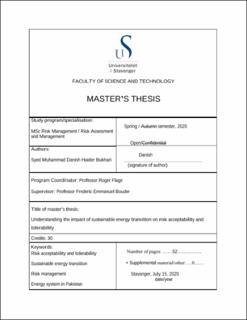Understanding the impact of sustainable energy transition on risk acceptability and tolerability
Master thesis
Date
2020-06Metadata
Show full item recordCollections
- Studentoppgaver (TN-ISØP) [1454]
Abstract
Risk analysis helps to estimate the level of risk of a given situation, and to determine if the risk is acceptable, tolerable, or unacceptable. At this stage, the consideration of individual or societal factors becomes very important in the decision-making process regarding the acceptability or the tolerability of a risk. The energy transition is likely to affect the balance between risks and benefits, resultantly, it will create new risks as well as new benefits and therefore it is important to understand what society is likely to accept or tolerate, something that has not been fully investigated especially in countries with growth potential where it is very important to combine sustainability with need for growth Without public acceptability, tolerability and support for changes, a sustainable energy transition is unlikely to be viable. We argue that risk acceptability is often addressed too late and should be incorporated into the planning process from the start. Moreover, engineers, policy makers, and project developers tend to misjudge the complexity and causes of public resistance, trying to find the magic bullet to “solve” the lack of risk acceptability.
The study is based on the positivism paradigm as this study aims to investigate the ‘understanding impact of sustainable energy transition on risk acceptability and tolerability’ objectively that can be observed and measured out in the general world. Quantitative research approach was used in line with positivism paradigm. The quantitative approach helps to study the cause and effect relationship. It also helps to collect systematic information to meet the objectives of research. Two Chinese power companies were selected for data collection. 1) China National Electric Engineering Company – CNEEC. 2) China power hub generation company (CPHGC). The rationale of selecting two energy companies as sample was due to Pandemic situation globally and due to inaccessibility of respondents. The total sample of 300 was selected for the data collection.
It is summarized that the scale of risk acceptability and tolerability in context of Pakistan is moderate that encourages companies to work progressively and increase socio-cultural activities to make the society as partner of this new shift in energy transition that will increase the level of risk acceptability ultimately. Furthermore, addressing the main research question, the risk acceptability and tolerability level in context of Pakistan is moderate. As a society, people are not high-risk taker neither risk avoider due to limitation of income, uncertainty and political instability.
Description
Master's thesis in Risk managment
